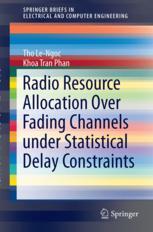

Most ebook files are in PDF format, so you can easily read them using various software such as Foxit Reader or directly on the Google Chrome browser.
Some ebook files are released by publishers in other formats such as .awz, .mobi, .epub, .fb2, etc. You may need to install specific software to read these formats on mobile/PC, such as Calibre.
Please read the tutorial at this link: https://ebookbell.com/faq
We offer FREE conversion to the popular formats you request; however, this may take some time. Therefore, right after payment, please email us, and we will try to provide the service as quickly as possible.
For some exceptional file formats or broken links (if any), please refrain from opening any disputes. Instead, email us first, and we will try to assist within a maximum of 6 hours.
EbookBell Team

4.0
46 reviewsThis SpringerBrief presents radio resource allocation schemes for buffer-aided communications systems over fading channels under statistical delay constraints in terms of upper-bounded average delay or delay-outage probability.
This Brief starts by considering a source-destination communications link with data arriving at the source transmission buffer. The first scenario, the joint optimal data admission control and power allocation problem for throughput maximization is considered, where the source is assumed to have a maximum power and an average delay constraints. The second scenario, optimal power allocation problems for energy harvesting (EH) communications systems under average delay or delay-outage constraints are explored, where the EH source harvests random amounts of energy from renewable energy sources, and stores the harvested energy in a battery during data transmission. Online resource allocation algorithms are developed when the statistical knowledge of the random channel fading, data arrivals, EH processes governing the system dynamics is unknown a-priori.
This Brief continues with a source-relay-destination communications link with buffers available at both source and relay, as part of a multi-hop network. Optimal resource allocation schemes for this 3-node relaying system to maximize its effective capacity under a delay-outage constraint are proposed, with special emphasis on relay roles: Half-duplex (HD) or full-duplex (FD) relay operation. With HD relay, the adaptive link selection relaying problem jointly with both fixed and adaptive power allocation schemes is investigated. Within each transmission frame, either the source-relay link or the relay-destination link is selected to be active depending on the channel conditions. With FD relay under the presence of non-zero residual self-interference (SI).
This Brief also presents source and relay power allocation schemes for both cases of available knowledge of the channel state information at transmitter (CSIT): instantaneous or statistical. Professional and researchers working in this related field and advanced-level students in electrical or computer engineering will find the content valuable as a reference.